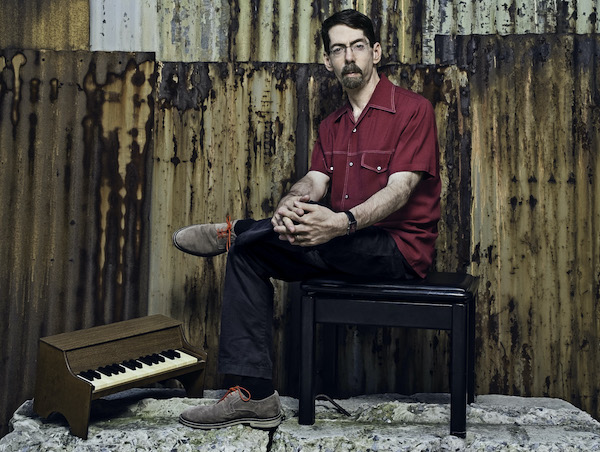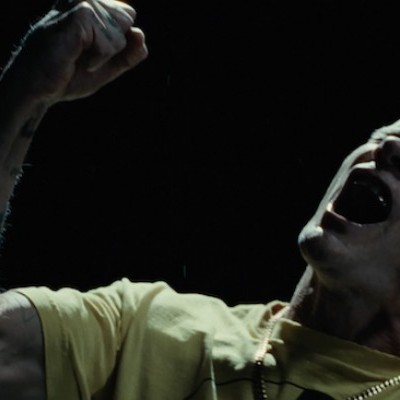Dec 9, 2025 12:28 PM
In Memoriam: Gordon Goodwin, 1954–2025
Gordon Goodwin, an award-winning saxophonist, pianist, bandleader, composer and arranger, died Dec. 8 in Los Angeles.…

Despite pianist Fred Hersch’s onstage composure, when he plays, there’s always something intensely personal stirring just below the surface.
(Photo: Vincent Soyez)The box set The Fred Hersch Trio: 10 Years/6 Discs captures a landmark ensemble in the studio, on the road and at its spiritual home, the Village Vanguard in Greenwich Village. Two of the albums’ six discs were session gigs and the remaining four recorded live. Curiously, Hersch assigned impressionistic titles to the studio dates—Whirl and Floating—while the live dates all received more pragmatic treatment: the two-disc Alive At The Vanguard, Sunday Night At The Vanguard and Live In Europe.
There might be something behind this. During his live performances, when he’s creating music instinctively, Hersch commands the room—quietly, but assuredly. He’s so confident in himself and his trio mates—bassist John Hébert and drummer Eric McPherson—that they hardly ever need to rehearse. Despite Hersch’s onstage composure, when he plays, there’s always something intensely personal stirring just below the surface.
Hersch released Whirl, the trio’s debut album, in 2010, just a year after forming the group and two years after surviving a near-fatal health crisis. The title cut, a Hersch original, spins dynamically around an ominous melodic riff, providing contrast with his other compositions on the album, like the lilting waltz of “Snow Is Falling ...” or the jaunty mixed-meter badinage of “Skipping.” For his originals, Hersch finds source material in those he admires: He dedicated that last cut to prima ballerina Suzanne Farrell, whose pirouettes inspired its motion.
A few more years into its musical relationship, in 2012, the trio recorded Alive At The Vanguard, the second and third installments in this collection. The band approached the tunes on this record—an even mix of standards and originals—with familiarity and ease; each note seems to spring wholly new from the trio’s fingers. On the recording, Hersch acknowledges the ensemble’s growing penchant for Thelonious Monk tunes, one of which usually closes their sets. Here, it’s a slow, shimmering “Played Twice”—part of a medley that also includes “The Song Is You.” Gorgeous.
Hersch was nominated for a Grammy for best improvised solo on “You & The Night & The Music,” from the trio’s 2014 release, Floating, the fourth disc here. The solo—on the first track—starts without preamble and gambols in a syncopated fever toward a smooth outro. It’s the ideal setup for the second tune, the title track, a dreamy, open exchange among the three players. “Floating is the magic sound-place where the trio spends a lot of time—trusting each other so much that we can leave space,” Hersch wrote in the liner notes.
By the time the trio released Sunday Night At The Vanguard in 2016, the fifth disc, the band had been playing together steadily for seven years and had attained an unusual synergism. They’d found a preferred curation for their sets: the retrofitted Broadway standard (“A Cockeyed Optimist”) first, followed by a handful of originals (like Hersch’s eerie “Serpentine”) and the requisite Monk tune (the powerful “We See”). Hersch’s work on the latter would earn him another Grammy nomination for Best Improvised Jazz Solo; the trio received its first nod, being nominated in the Best Jazz Instrumental Album category.
The trio’s 2018 Live In Europe came as a surprise. They discovered that tape had been rolling during the penultimate concert of a 2017 European tour—it was too good to waste.
On this disc, the sixth in this retrospective, they reprise “Skipping” and “We See”—and again snagged Grammy nominations in the same categories as in 2016. But on this record, Hébert and McPherson figure more prominently than on others, sending up impeccable improvisations on tunes like “Snape Maltings” and “Scuttlers,” while Hersch lays out a bit.
In these moments, especially, the group bond—unspoken and personal—is palpable. DB

Goodwin was one of the most acclaimed, successful and influential jazz musicians of his generation.
Dec 9, 2025 12:28 PM
Gordon Goodwin, an award-winning saxophonist, pianist, bandleader, composer and arranger, died Dec. 8 in Los Angeles.…

Belá Fleck during an interview with Fredrika Whitfield on CNN.
Jan 13, 2026 2:09 PM
The fallout from the renaming of the John F. Kennedy Center for the Performing Arts to include President Donald…

The success of Oregon’s first album, 1971’s Music Of Another Present Era, allowed Towner to establish a solo career.
Jan 19, 2026 5:02 PM
Ralph Towner, a guitarist and composer who blended multiple genres, including jazz — and throughout them all remained…

Flea has returned to his first instrument — the trumpet — and assembled a dream band of jazz musicians to record a new album.
Dec 2, 2025 2:01 AM
After a nearly five-decade career as one of his generation’s defining rock bassists, Flea has returned to his first…

Rico’s Anti-Microbial Instrument Swab
Jan 19, 2026 2:48 PM
With this year’s NAMM Show right around the corner, we can look forward to plenty of new and innovative instruments…